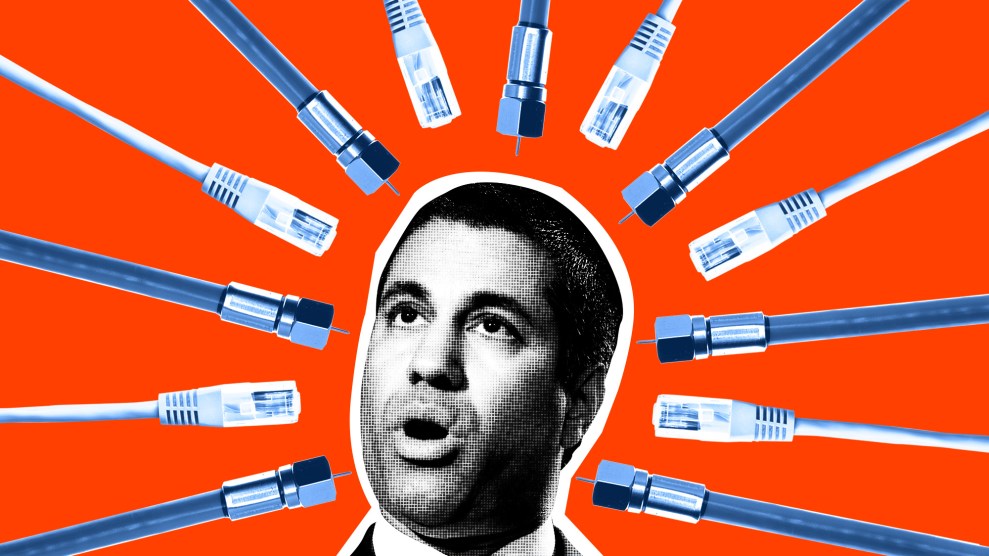
Mother Jones illustration; David Becker/ZUMA, Getty
Comedians and the Federal Communications Commission have not always been the best of friends. But the conflict between HBO’s Last Week Tonight with John Oliver and the agency in charge of regulating the nation’s communications sector had nothing to do with the seven dirty words. Instead, it all started when Oliver told viewers to submit comments to the agency in an effort to revive net neutrality. The next day, the FCC claimed that an onslaught of comments following the segment had overwhelmed the agency’s comment system and had caused it to crash. The agency’s then-Chief Information Officer David Bray determined the large volume of comments had been the work of bots, the result of a distributed denial-of-service (DDoS) attack, despite having experienced similar outages in 2014 after a different segment where Oliver urged his viewers to write the agency.
The problem? The alleged DDoS never happened. Over a year later, after an internal investigation into the matter was made public, FCC Chairman Ajit Pai admitted to Congress that the initial report that bots were responsible had been wrong; the system crashed because it couldn’t handle the number of authentic comments inspired by Oliver’s segment. After months of accusations from the press and lawmakers that the FCC had deceived the public about the attack, an answer was reached. But net neutrality was already dead. According to the agency’s own inspector general, the “FCC made several specific statements that we believe misrepresent facts about the event or provide misleading information [to Congress].”
Even at the close of the DDoS investigation, questions lingered. Why had it taken the FCC nearly half a year to disclose to Congress that a DDoS attack had not been the cause of the site crash? Why, despite immense skepticism from both the press and tech advocates, did an agency regulating the internet so credulously believe the claims in the first place? Many of these questions were raised in an August oversight hearing of the agency—just the second in a year in which the agency had undergone rapid deregulation. Pai didn’t have much to say on the matter, except that the agency’s inspector general had advised him to not discuss the open investigation because the issue had been sent to the Department of Justice for “potential criminal prosecution.”
“I guess what I’m looking for is some measure of accountability,” Sen. Brian Schatz (D-Hawaii) told Pai at the hearing. In late October, Schatz was one of several senators to sign a letter pressing the FCC inspector general to further investigate other issues related to the net neutrality comment process; namely, if the number of comments from stolen identities—nearly 10 million—were the product of Russian interference.
“That’s a crime under federal and state law. And it happened here and the agency has not done anything to investigate this crime or fix this problem,” says FCC Commissioner Jessica Rosenworcel, the sole Democrat on the commission. “And it’s certainly something that I think Congress should shine a light on.”
House Democrats have expressed similar concerns as their colleagues in the Senate. “He never said, ‘I was wrong’ or ‘It turns out we were given misinformation.’ He just kept holding to that line. When someone lies like that, you have to hold them accountable,” Rep. Debbie Dingell (D-Mich.), who sits on the House Energy and Commerce Committee, tells Mother Jones. “I think we have got to understand why they gave us such wrong information.”
But now that Democrats are about to take charge of the House in January, lawmakers plan to force some accountability on Pai. FCC oversight is a top priority for the House Energy and Commerce Committee in the upcoming session, according to committee members.
“We plan to put the consumer first by pushing policies that protect net neutrality, promote public safety, and provide meaningful privacy and data security protections that are seriously lacking today,” ranking member Rep. Frank Pallone (D-N.J.), who is running to chair the committee, wrote in a statement to Mother Jones. “It’s also important that the committee get back to conducting real oversight of the FCC, and that means regular oversight hearings with all commissioners.”
Congress won’t be lacking for things to look into. While many Trump favorites have been undone by their own extravagance, the FCC has managed to quietly undo decades of regulations, leaving a trail of backdoor meetings and potential ethics violations along the way.
Here are just a few of the topics that will come under the spotlight as Congress looks into Pai’s tenure at the FCC:
Net neutrality
It’s still unclear what legal path forward remains for net neutrality. In May, the Senate voted to pass a Congressional Review Act that would overturn the FCC’s gutting of net neutrality rules. But the measure has gone nowhere in a Republican-led House, and it looks unlikely the CRA will come up for a vote before this Congress ends. The time limit for passing a CRA expires in December, so Democrats won’t have that option when they control the chamber, although they could push new legislation to try to restore net neutrality.
Once the House Energy and Commerce Committee selects its new chair, representatives will likely join their colleagues in the Senate in calling for an investigation into comment fraud. While the agency has repeatedly rebuffed efforts from journalists to investigate comment fraud, the new Congress could subpoena evidence, such as the IP addresses of fraudulent comments.
Industry connections
The FCC has long been a revolving door for the telecommunication industry it regulates, but under Pai’s watch, tech industry giants have gained unprecedented access to crafting the rules of their trade.
Just a month after meeting with then-President-elect Trump and advisers Jared Kushner and Peter Thiel to discuss a pending merger between AT&T and Time Warner, Pai had a private dinner with executives from the company. In February 2017, on the first day of the Mobile World Conference in Barcelona, Pai had a private dinner with John Stankey, CEO of WarnerMedia, and Bob Quinn, former senior executive vice president of external and legislative affairs at AT&T.
“A private dinner between Chairman Pai and an AT&T executive who hired Michael Cohen to influence the president doesn’t reflect well on the impartiality of the FCC,” Austin Evers, executive director of American Oversight, the group that discovered the meeting via FOIA requests, said in a statement earlier this year. “Pai should disclose exactly what was discussed at the dinner and who organized the meeting.” Quinn, the executive Evers is referencing, left AT&T after the company got heat for hiring Cohen. It was reported that Cohen had been hired to consult with AT&T on its merger with Time Warner.
According to the initial invitation sent in January 2017, the dinner aimed to “bring together a very small group of senior-level leaders to share ideas and views on our sector risks and solutions. It will be a very informal dinner where your participation and perspective would contribute greatly to a productive dialogue.” AT&T and the FCC did not respond to Mother Jones‘ questions about these meetings
In addition to the dinner, FOIA documents that American Oversight shared with Mother Jones reveal that AT&T played an additional fixer role during the trip, setting up what an aide described in an email as “key” meetings with the media and European regulators.
The Barcelona meeting occurred just a month after Cohen began working for AT&T, though Pai has denied meeting with him. The FCC has direct regulatory authority over many of the company’s key business functions, including potential mergers and its participation in the first wave of highly coveted 5g spectrum auctions.
“The FCC is an example of how Washington today isn’t just a more egregious version of its traditional swampy character,” Evers tells Mother Jones. “It’s crossing the line to just out-and-out alignment between the regulated and the regulators.”
Sinclair Broadcasting
Pai, a former Verizon lawyer, was also investigated by the agency’s inspector general, at Congress’ request, to look into whether he had taken measures to “improperly benefit” the Sinclair Broadcasting company with his decision to undo media ownership laws that cleared the way for a $3.9 billion merger between Sinclair and Tribune Media. The merger fell apart almost a year later in August 2018, and Pai was cleared by the inspector general—affirming Pai’s previous claims that his Sinclair decision was consistent with his previous decisions on the committee.
“I have called on the FCC for many years to update its outdated media ownership regulations to match the realities of the modern marketplace,” Pai said in a statement when the report was released. “As I said when this investigation was first announced, the suggestion that I favored any one company was absurd.”
But the report raised even more questions about what Pai had communicated with the White House regarding Sinclair. For instance, the report revealed Pai had failed to disclose a conversation with White House counsel Don McGahn about the Sinclair-Tribune merger weeks before its collapse. Weeks after the conversation, Pai told a House oversight committee that he had not discussed the matter with the Trump administration. The report also made clear Pai had spoken with White House adviser Jared Kushner on the phone in May 2017, but when asked about the conversation he “did not recall” any of the details. Politico reported that during Trump’s campaign, Kushner had been involved in brokering a deal with Sinclair for better coverage of the campaign.
A follow-up Office of the Inspector General report provided some clarification—or at least absolution for Pai. The November 26 report once again cleared Pai of any misconduct during the Sinclair merger proceedings. Outside of the call with McGahn, which the report determines Pai was not required to disclose, the report found no other communication between the White House and the FCC. The report made no mention of Pai’s call with Kushner, and the FCC did not respond to a request for clarification.
Broadband
Alongside a passion for deregulation, Pai and Trump shared a vision for broadband connectivity that benefits rural Americans. But even Republicans have started to question if the agency has begun to fall short on its promises. Pai has come under pressure by leading Republicans, including Sen. John Thune (R-S.D.), the Senate Commerce Committee chair, for the agency’s “unacceptable failure” to provide enough subsidies to rural carriers for its broadband expansion programs under the Universal Service Fund. Pai has trimmed the budget of the fund significantly since taking office, including cuts to the Lifeline Program, which provides internet and phone subsidies to the poorest Americans.
The FCC’s slow progress on updating America’s technological infrastructure will likely be a bipartisan talking point at any future oversight hearings. While Republicans and Democrats have struggled to agree on funding for high-speed internet in the past, both Pallone and Sen. Roger Wicker (R-Miss.), who will likely chair the Senate Commerce, Science, and Transportation Committee, have called for increased funding.
“The administration is acting like they can outrun it forever. 2019 will change that, whether that’s from the outside or from Congress,” Evers tells Mother Jones. “When public officials don’t feel shame, others can show it for them.”

















